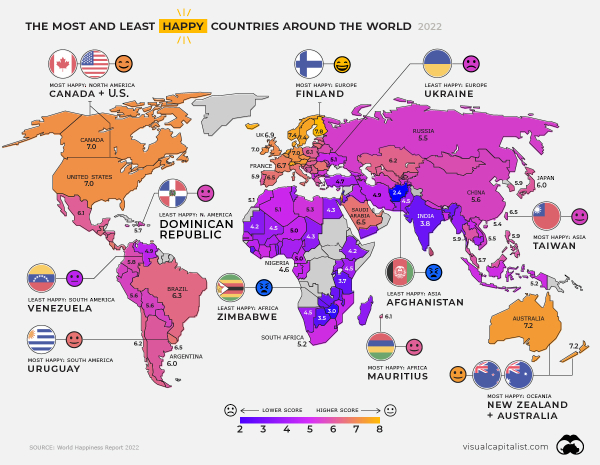Happiness is a complex concept comprised of conditions that highlight positive emotions over negative ones – bolstered by the support of comfort, freedom, wealth, and other things people aspire to experience.
Regardless of how hard it is to describe (let alone quantify) … humans strive for happiness.
Likewise, it is hard to imagine a well-balanced and objective "Happiness Report" because so much of the data required to compile it seems subjective and requires self-reporting.
Nonetheless, the World Happiness Report takes an annual look at quantifiable factors (like health, wealth, GDP, and life expectancy) and more intangible factors (like social support, generosity, emotions, and perceptions of local government and businesses). Click the image below to view the Report.
 via visualcapitalist
via visualcapitalist
In their 2021 report, there was a significant focus on the effect of COVID-19 on happiness levels and mental health. Much of that continued into the 2022 report.
As you might expect, the pandemic caused a significant increase in negative emotions reported. Specifically, there were substantial increases in reports of worry and sadness across the ninety-five countries surveyed. The decline in mental health was higher in groups prone to disenfranchisement or other particular challenges – e.g., women, young people, and poorer people.
It is remarkable how resilient and stable the scores have been globally considering the amount of uncertainty, stress, and disruption households experienced this past year.
Ultimately, humans persevered in the face of economic insecurity, anxiety, and challenges to mental and physical health.
This year, the average score improved slightly compared to 2021 – though worry and stress have continued to rise.
There has been a decrease in overall happiness compared to pre-pandemic scores. Yet, the relative balance demonstrated in the face of such adversity may point towards the existence of a hedonic treadmill – or a set-point of happiness.
Regardless of the circumstances, people can focus on what they choose, define what it means to them, and choose their actions.
I'm still surprised by what people can get used to … and how some people find pockets of joy in even the hardest of times. Conversely, other people use the same ability to feel profound unhappiness, even when they have seemingly everything.
It's an oddly beautiful reminder that happiness comes from within.
Another bright spot, worth mentioning, has been the massive global upsurge in benevolence. People are supporting others, communities have stepped up, more money is being donated to charity, and more people are volunteering.
Onwards!

Leave a Reply